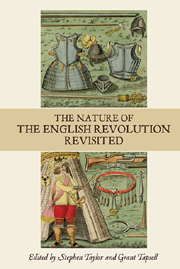Book contents
- Frontmatter
- Contents
- Preface and Acknowledgements
- List of contributors
- List of Abbreviations
- 1 Charles I and Public Opinion on the Eve of the English Civil War
- 2 Rethinking Moderation in the English Revolution: The Case of An Apologeticall Narration
- 3 The Parish and the Poor in the English Revolution
- 4 Body Politics in the English Revolution
- 5 The franchise Debate Revisited: The Levellers and the Army
- 6 Oliver Cromwell and the Instrument of government
- 7 ‘de te fabula narratur’: The Narrative Constitutionalism of James Harrington's Oceana
- 8 Democracy in 1659: Harrington and the Good Old Cause
- 9 The Restoration of the Church of England, 1660–1662: Ordination, Re-ordination and Conformity
- 10 Style, Wit and Religion in Restoration England
- 11 A British Patriarchy? Ecclesiastical Imperialism under the Later Stuarts
- Index
- Studies in Early Modern Cultural, Political and Social History
1 - Charles I and Public Opinion on the Eve of the English Civil War
Published online by Cambridge University Press: 05 July 2013
- Frontmatter
- Contents
- Preface and Acknowledgements
- List of contributors
- List of Abbreviations
- 1 Charles I and Public Opinion on the Eve of the English Civil War
- 2 Rethinking Moderation in the English Revolution: The Case of An Apologeticall Narration
- 3 The Parish and the Poor in the English Revolution
- 4 Body Politics in the English Revolution
- 5 The franchise Debate Revisited: The Levellers and the Army
- 6 Oliver Cromwell and the Instrument of government
- 7 ‘de te fabula narratur’: The Narrative Constitutionalism of James Harrington's Oceana
- 8 Democracy in 1659: Harrington and the Good Old Cause
- 9 The Restoration of the Church of England, 1660–1662: Ordination, Re-ordination and Conformity
- 10 Style, Wit and Religion in Restoration England
- 11 A British Patriarchy? Ecclesiastical Imperialism under the Later Stuarts
- Index
- Studies in Early Modern Cultural, Political and Social History
Summary
In his biography of Archbishop Laud, penned in the 1650s, Peter Heylyn contrasted Queen Elizabeth's skilful deployment of royal ceremonial to make herself ‘popular’ with ‘her People’ - ‘never Majesty and Popularity were so matched together’, he observed - with James I's and Charles I's failings in this regard. The result was catastrophic: ‘first a neglect of their Persons … and afterwards a mislike of their Government’. Writing on the eve of the Restoration, the marquess of Newcastle agreed that ‘Sere-money doth Every thing’, and therefore advised the soon-to-be Charles II to imitate Queen Elizabeth and show himself ‘Gloryously, to [his] People’; he was adamant, however, that Charles should keep tight control over the press, since among the many errors of ‘these Laste two Raynes’ was allowing ‘Every man’ to become ‘a state man’ by their reading of domestic and foreign newsbooks. A quarter of a century later, licenser of the press and govern¬ment hack Roger L'Estrange concluded that Charles I's error had been not so much allowing the people to read the news as failing to do a good enough job in getting his own views across in the press. ‘The Government itself’, L'Estrange believed, ‘is Answerable in a High Measure for the Distempers of the Multitude’; ‘if the King's Friends would but take Half the Pains, to set them Right, that his Enemies do, to Mislead them, you would find … the Common People as well Dispos'd to Preserve the Government, as they are Otherwise, to Embroil it’.
- Type
- Chapter
- Information
- The Nature of the English Revolution Revisited , pp. 1 - 26Publisher: Boydell & BrewerPrint publication year: 2013



